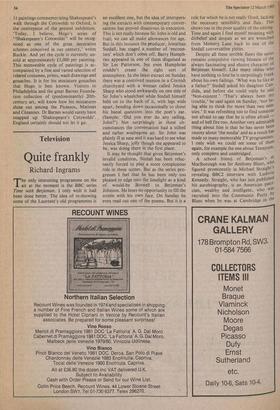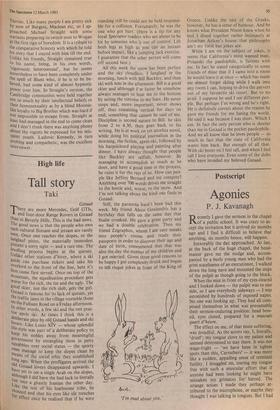Television
Quite frankly
Richard Ingrains
The only interesting programme on the air at the moment is the BBC series Time with Betjeman. I only wish it had been done better. The idea of re-showing some of the Laureate's old programmes is an excellent one, but the idea of interspers- ing the extracts with contemporary conver- sations has proved disastrous in execution. This is not really because Sir John is old and frail; we can all make allowances for age. But in this instance the producer, Jonathan Stedall, has staged a number of 'encoun- ters' which don't come off. Barry Humph- ries appeared in one of them disguised as Sir Les Patterson, but even Humphries couldn't create the right sort of atmosphere. In the latest extract on Sunday there was a contrived reunion in a Cornish churchyard with a woman called Jessica Sharp who stood awkwardly on one side of Sir John's wheelchair while Stedall himself held on to the back of it, with legs wide apart, bending down occasionally to shout his banal questions into the poet's ear. (Sample: 'Did you ever do any sailing, John?') Not surprisingly in these cir- cumstances the conversation had a stilted and rather woebegone air. Sir John was plainly ill at ease and it was hard to see what Jessica Sharp, jolly though she appeared to be, was doing there in the first place. It may be thought that given Betjeman's invalid condition, Stedall has been reluc- tantly forced to play a more conspicuous role in these scenes. But as the series pro- gresses I feel that he has been only too pleased to edge into the limelight as a kind of would-be Boswell to Betjeman's Johnson. He loses no opportunity to fill the screen with his own face. On Sunday he 'even read out one of the poems. But it is a role for which he is not really fitted, lacking the necessary sensibility and flair. This shows too in the poor quality of the editing, Time and again I find myself moaning with disbelief and despair as we are wrenched from Memory Lane back to one of the Stedall conversation pieces. Despite all these terrible flaws the series remains compulsive viewing because of the always fascinating and elusive character of Betjeman himself. Like many oldies who have nothing to lose he is surprisingly frank about his own failings. 'What was he like as a father?' Stedall asked his daughter Can- dida, and before she could reply he said 'Non-existent.' 'That's always been rilY trouble,' he said again on Sunday, 'not be- ing able to think for more than two min- utes.' It was refreshing too to find someone not afraid to say that he is often afraid and of hell fire too. Another very admirable thing about him is that he has never been snooty about 'the media' and as a result has made so many memorable TV programmes. I only wish we could see some of them again, for example the one about Tennyson, only complete and unabridged. A school friend. of Betjeman's at Marlborough was Sir Anthony Blunt, wb° figured prominently in. Michael Straight's revealing BBC2 interview with Ludovie Kennedy. Straight, who has just published
.
his autobiography, is an American Patri' cian, wealthy and intelligent, who was recruited into the Communist Party by Blunt when he was at Cambridge in the Thirties. Like many people I am pretty sick by now of Burgess, Maclean etc, so I ap- proached Michael Straight with some wariness preparing to switch over to Wogan at the first sign of boredom. It is a tribute to the comparative honesty with which he told his story that I stayed with him till the end. Unlike his friends, Straight remained true to his name, being, in his own words, vigorously heterosexttal', but he seems nevertheless to have been completely under the spell of Blunt who, if he is to be be- lieved, had some kind of almost hypnotic Power over him. In Straight's version, the Cambridge communists were held together not so much by their intellectual beliefs or their homosexuality as by a blind Moonie- like loyalty to Big Brother which was hard if not impossible to escape from. Straight at least had managed in the end to come clean and I don't think there was anything phony about the regrets he expressed for his mis- spent youth. Ludovic Kennedy, in turn probing and sympathetic, was the excellent interviewer.











































 Previous page
Previous page